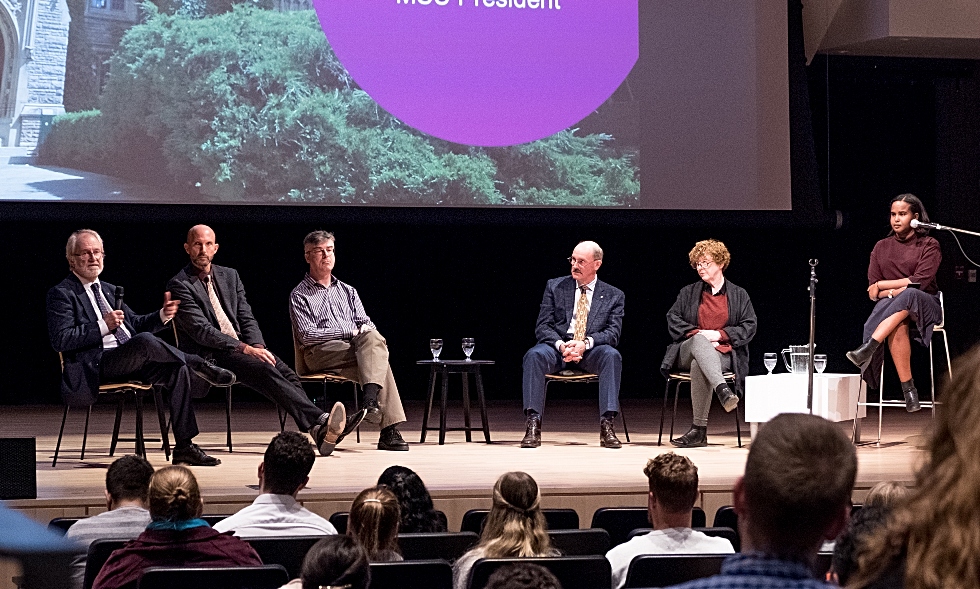Town Hall update showcases new programs, opportunities for global engagement

McMaster faculty, staff and students recently had the opportunity to learn more about a host of new internationally-focused programs, initiatives, and resources at the McMaster Global Engagement Town Hall, held last week in L.R. Wilson Hall. From left: McMaster President Patrick Deane; Associate Vice-President (Students and Learning) and Dean of Students, Sean Van Koughnett; Acting Vice-Provost and Dean of Graduate Studies, Michael Thompson; Vice-Provost International Affairs, Peter Mascher; Associate Vice-President of Global Health, Andrea Baumann; and MSU President, Ikram Farah, who moderated the Q&A session.
From the creation of an online global portal with a range of resources, to activities and programming for undergraduate and graduate students seeking to study abroad, a host of new initiatives and opportunities for global engagement have been developed campus-wide in support of McMaster’s global engagement strategy.
Recently, McMaster faculty, staff and students had the opportunity to learn more about many of these initiatives from leaders across the university who spoke at the first annual McMaster Global Engagement Town Hall, held last week in L.R. Wilson Hall.
“Global engagement is critically important for a university,” said McMaster President Patrick Deane who gave opening remarks at the event. “I think the measure of an institution is inseparable from its ability to position itself in a global context, and the more successful we are at that, the higher we will lift ourselves in the international community.”
During the town hall, Vice-Provost International Affairs, Peter Mascher, provided a number of updates, announcing the launch of the new McMaster Global Engagement Hub– an online portal for accessing information about McMaster’s global engagement model, supports, services, opportunities, news and events. As well, he talked about ongoing discussions to create a physical space on campus that would house staff and resources dedicated to global engagement.
Mascher also spoke about McMaster’s global engagement strategy, as well the importance of participating in international networks, providing examples of globally-focussed organizations in which McMaster has become a member in recent years, including the Observatory of the Magna Charta, the United Nations Academic Impact, and the Universitas 21, among others. “Networks like these helps us to look outward rather than inward, and this is critically important as we seek to engage globally,” he said.
Associate Vice-President (Students and Learning) and Dean of Students, Sean Van Koughnett, spoke about the need to support the growing percentage of international students on McMaster’s campus, highlighting a number of programsdesigned to welcome and assist these students. These include Airport Welcome, an initiative in which international students are greeted up their arrival; iCent, a new app that provides information related to settlement and immigration; and the Ignite Program, aimed at supporting first-year international students living in residence.
Van Koughnett also spoke about expanded opportunities related to student mobility such as the new McCall MacBain International Fellowships, which will provide funding for up to 10 McMaster students to spend a year abroad. As well, he spoke about the creation of new positions within the Student Success Centre to support both international and domestic students, including a Global Experience Coordinator to help connect students to international opportunities.
Acting Vice-Provost and Dean of Graduate Studies, Michael Thompson, provided updates on new collaborative joint PhD and master’s programs that are being developed with universities around the world, pointing to a new partnership between McMaster’s Classics department and the University of Rome, La Sapienza– the top ranked university in the world in the area of archaeology – which will allow master’s and PhD students from McMaster and the University of Rome to study at both universities.
Finally, Associate Vice-President of Global Health, Andrea Baumann, talked about the updated International Activity Compendium, which highlights the university’s global research and scholarly activities,spanning across all Faculties.
The compendium, which can be found online on the McMaster Global Engagement Hub, contains snapshots of the nearly 2000 partnerships taking place in 247 countries, territories and islands worldwide, representing a 41% increase in global activities reported since 2014 when the compendium was last published. Though, at present, the compendium is made up of recent and ongoing activities, Baumann said faculty will soon be able to add their global projects to the compendium on a continuous basis.
The McMaster Global Engagement Town Hall tookplace as part of MacGlobal (October 22 – November 9), three weeks of international programming to showcase the many international initiatives and activities taking place campus-wide.
MacGlobal is in support of McMaster’s Global Engagement Strategy as outlined in The McMaster Model for Global Engagement: A Strategy Document released in 2016. The document was the first step in the development of the university’s international strategy – a key institutional priority – and continues to provide a framework for the development of international activities at McMaster.


